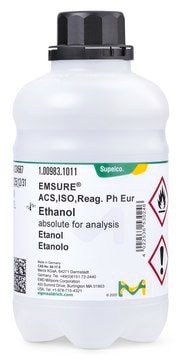1.01040
2-Propanol
≥99.9% (GC), gradient grade, suitable for HPLC, LiChrosolv®
Synonym(s):
sec-Propyl alcohol, IPA, Isopropanol, Isopropyl alcohol
About This Item
43 hPa ( 20 °C)
44 mmHg ( 25 °C)
Recommended Products
Product Name
2-Propanol, gradient grade for liquid chromatography LiChrosolv®
vapor density
2.1 (vs air)
Quality Level
vapor pressure
33 mmHg ( 20 °C)
43 hPa ( 20 °C)
44 mmHg ( 25 °C)
product line
LiChrosolv®
grade
gradient grade
Assay
≥99.9% (GC)
form
liquid
autoignition temp.
750 °F
potency
5045 mg/kg LD50, oral (Rat)
12800 mg/kg LD50, skin (Rabbit)
expl. lim.
2.0-12.7 %, 93 °C
technique(s)
HPLC: suitable
impurities
≤0.0002 meq/g Acidity
≤0.0002 meq/g Alkalinity
≤0.05% Water
evapn. residue
≤2.0 mg/L
transmittance
220 nm, ≥80% (Checking after purging with N2)
230 nm, ≥90% (Checking after purging with N2)
250 nm, ≥99% (Checking after purging with N2)
refractive index
n20/D 1.377 (lit.)
pH
7 (20 °C)
bp
82 °C (lit.)
mp
−89.5 °C (lit.)
transition temp
flash point 12 °C
density
0.785 g/mL at 25 °C (lit.)
SMILES string
CC(C)O
InChI
1S/C3H8O/c1-3(2)4/h3-4H,1-2H3
InChI key
KFZMGEQAYNKOFK-UHFFFAOYSA-N
Looking for similar products? Visit Product Comparison Guide
General description
Application
- prepare the isocratic mobile phase for reversed phase LC-MS-MS analysis.
- prepare stock solution of the phospholipid species.
- wash the slide during hematoxylin and eosin (H&E) staining procedure.
Preparation Note
Analysis Note
Identity (IR): conforms
Evaporation residue: ≤ 2.0 mg/l
Water: ≤ 0.05 %
Acidity: ≤ 0.0002 meq/g
Alkalinity: ≤ 0.0002 meq/g
Gradient grade (at 235 nm): ≤ 1.0 mAU
Gradient grade (at 254 nm): ≤ 1.0 mAU
Transmission (Checking after purging with N₂ (at 220 nm)): ≥ 80 %
Transmission (Checking after purging with N₂ (at 230 nm)): ≥ 90 %
Transmission (Checking after purging with N₂ (from 250 nm)): ≥ 99 %
Filtered by 0.2 µm filter
Other Notes
Legal Information
related product
Signal Word
Danger
Hazard Statements
Precautionary Statements
Hazard Classifications
Eye Irrit. 2 - Flam. Liq. 2 - STOT SE 3
Target Organs
Central nervous system
Storage Class Code
3 - Flammable liquids
WGK
WGK 1
Flash Point(F)
53.6 °F - closed cup
Flash Point(C)
12.0 °C - closed cup
Certificates of Analysis (COA)
Search for Certificates of Analysis (COA) by entering the products Lot/Batch Number. Lot and Batch Numbers can be found on a product’s label following the words ‘Lot’ or ‘Batch’.
Already Own This Product?
Find documentation for the products that you have recently purchased in the Document Library.
Customers Also Viewed
Protocols
Thin layer chromatography coupled with mass spectrometry does not require substantial sample preparation. Energy drinks can be applied without dilution directly onto the TLC plate.
HPTLC–MS analysis of quinine in tonic water and caffeine in coffee and cola drinks. Tonic and cola drinks decarbonized through ultrasonication, and coffee extracted through PTFE filter.
Our team of scientists has experience in all areas of research including Life Science, Material Science, Chemical Synthesis, Chromatography, Analytical and many others.
Contact Technical Service








